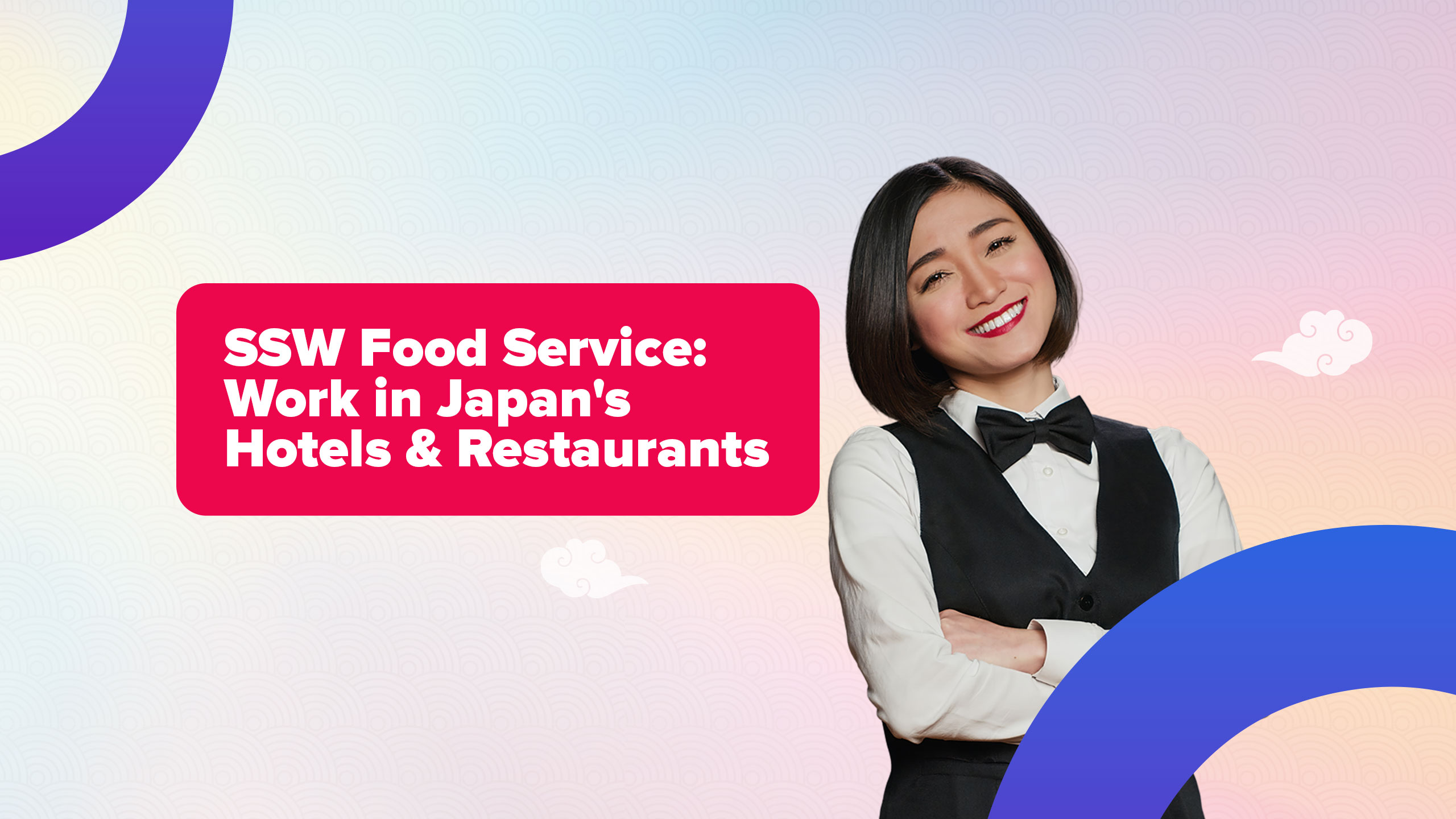
The demand for SSW (Specified Skilled Worker) in Japan is growing stronger than ever in 2025!
Since its launch in April 2019, Japan’s Specified Skilled Worker (SSW) visa has opened thousands of employment doors to foreign nationals, especially from countries like Nepal.
The Japanese government had set an ambitious target to recruit between 260,000 to 340,000 workers under this program by 2024, and numbers show it’s well on track. As of 2024, over 284,000 foreign nationals were already working under the SSW status in Japan.
With one of the fastest ageing populations in the world and a declining birth rate, Japan is actively seeking foreign talent in key sectors like nursing, agriculture, food service, manufacturing, and construction.
Japan's well-supported SSW visa program offers a significant opportunity for Nepali workers to secure stable, well-paying jobs and live in a safe, advanced country. Explore this blog to understand how to benefit from the SSW program, job scope in Japan for Nepalese workers, and choose your ideal field.
Table of Contents
- What Are the Benefits of the SSW Program in Japan?
- Top SSW Job Sectors in Japan in 2025
- Japanese Work Culture and Employer’s Expectations
- How Can Nepali Workers Prepare for SSW Jobs in Japan?
- Conclusion: The Expanding SSW Market in Japan for Nepal
- FAQs - Demand and Scope of SSW Jobs in Japan
What Are the Benefits of the SSW Program in Japan?
The SSW program in Japan offers foreign workers opportunities for stable employment, competitive wages, skill development, cultural immersion, and employment support systems, with the potential for long-term residency in certain fields. Here are some of the most rewarding aspects of working in Japan under the SSW visa:
1. Equal Pay and Working Conditions
All SSW workers receive the same salary, benefits, and rights as their Japanese counterparts. This includes health insurance, paid leaves, and regulated working hours. This fair pay maintains uniformity, avoids employee expectations, and saves you from toxicity in the work environment to some extent.
2. Cultural and Life Experience
Living in Japan lets you experience a different rhythm of life; clean cities, efficient transport, disciplined workplaces, and a deep sense of social respect. For Nepali workers, it’s also a chance to experience personal growth through cultural exchange.
3. Support System for Workers
From language training to workplace orientation, many Japanese employers and agencies offer support systems that help workers adjust more smoothly. These include familiarising you with company policies, Japanese work culture/etiquette, providing job-specific training, taking care of your housing assistance, health, and safety with lifestyle orientation.
4. Career Progression and Skill Recognition
Unlike many temporary labor schemes, the SSW program recognizes your skills formally. With time, you may even qualify to bring family members or switch to other long-term visa types, such as a student visa, if you wish to study further in Japan.
5. Reliable Income and Quality of Life
Most SSW jobs in Japan pay a stable, decent salary, especially in caregiving, construction, and manufacturing sectors. This allows many Nepali workers to support families back home, save for the future, or even settle long-term.
Top SSW Job Sectors in Japan in 2025
In 2025, the roles in nursing care, construction, agriculture, building cleaning management, and food service are the most in-demand SSW jobs in Japan, due to Japan's ageing population and labor shortages in these sectors.
Further here, explore which Japanse cities have the highest demand for SSW, why Nepali workers are well-suited, where to find jobs, and what kind of salary you can expect.
1. Nursing Care (Kaigo)
Japan’s Need:
With nearly 30% of Japan’s population aged over 65, the country is facing a critical shortage of caregivers. Nursing homes, hospitals, and home care services are under pressure to hire kind and skilled workers to provide day-to-day assistance to the elderly.
Why Nepali Workers Are a Good Fit:
Many Nepali youths are drawn to caregiving roles abroad due to their compassionate nature, strong work ethic, and patience. Our cultural respect toward elders and family-first values make Nepalese workers naturally suited for this sector.
Where to Find Jobs:
Caregiving jobs are in demand across all major cities, especially Tokyo, Osaka, Sapporo, Nagoya, and many rural prefectures where elderly populations are even more concentrated.
Approximate Salary:
- Entry Level: ¥170,000–¥210,000/month
- With Experience or Language Proficiency: ¥220,000–¥250,000/month
2. Building Cleaning Management
Japan’s Need:
Japan has very punctual and precise standards when it comes to cleanliness. From shopping malls to hospitals and high-rise offices, cleaning staff are always in demand, especially in urban centres. Also, with the increasing commercial real estate, the need for trained, reliable workers is rising steadily.
Why Nepali Workers Are a Good Fit:
Nepali workers are valued for being diligent, disciplined, energetic, and respectful of instructions, the traits that align well with Japanese cleaning protocols and standards.
Where to Find Jobs:
Cleaning roles are most common in Tokyo, Fukuoka, Osaka, Yokohama, and industrial areas with large buildings and commercial complexes.
Approximate Salary:
- Entry Level: ¥160,000–¥200,000/month
- Experienced/Supervisory Roles: ¥210,000–¥240,000/month
3. Accommodation Industry (Hotels & Hospitality)
Japan’s Need:
Japan's tourism sector is bouncing back post-pandemic, with an increasing number of foreign visitors. Hotels, resorts, and guesthouses are looking to hire staff for front desk, housekeeping, kitchen, and concierge services.
Why Nepali Workers Are a Good Fit:
Nepali workers are known for being friendly, humble, and service-oriented. Those with basic Japanese and English language skills can perform well in guest-facing roles. Nepalese culture naturally shapes you to satisfy the guests with excellent customer service.
Where to Find Jobs:
Hospitality jobs are concentrated in tourist hotspots like Kyoto, Tokyo, Osaka, Hokkaido, and Okinawa.
Approximate Salary:
- Entry Level: ¥180,000–¥210,000/month
- Guest-facing Roles with Language Skills: ¥220,000–¥250,000/month
4. Agriculture
Japan’s Need:
Japan’s rural agricultural areas are facing a serious labor shortage due to depopulation and ageing farmers. The country is opening up to foreign workers to help with harvesting, planting, greenhouse work, and crop management.
Why Nepali Workers Are a Good Fit:
Many Nepali workers have hands-on farming experience and are used to working in physically demanding environments. Our familiarity with high-altitude farming and seasonal crops also adds value.
Where to Find Jobs:
Agricultural work is mostly available in prefectures like Ibaraki, Shizuoka, Hokkaido, and Nagano.
Approximate Salary:
- Entry Level: ¥160,000–¥190,000/month
- Peak Season or Extended Hours: ¥200,000–¥230,000/month
5. Food Service Industry
Japan’s Need:
Food chains, restaurants, bakeries, and convenience stores in Japan are heavily reliant on part-time and full-time service staff. From kitchen assistants to fast-food prep workers, there’s a strong push to hire SSW workers due to limited local interest in these roles.
Why Nepali Workers Are a Good Fit:
Nepali youth are enthusiastic and capable in high-paced food environments. Many have prior experience in hospitality and culinary training, making them quick learners in Japanese kitchens.
Where to Find Jobs:
Look for opportunities in Tokyo, Chiba, Osaka, Kyoto, and other cities with busy food districts and shopping arcades.
Approximate Salary:
- Kitchen/Service Staff: ¥180,000–¥210,000/month
- Experienced Roles (Chefs, Team Leaders): ¥230,000–¥260,000/month
Japanese Work Culture and Employer’s Expectations
Japan is known for its discipline, precision, and respect-driven work environment. Understanding the work culture is essential for any SSW applicant preparing to live and work there.
1. Respect and Hierarchy
Japanese workplaces follow a clear chain of command. Respect toward supervisors and senior staff is not just encouraged but expected. Workers are addressed formally, and bowing is a routine gesture of politeness.
2. Punctuality and Consistency
Time management is a serious matter. Arriving even five minutes late can be seen as disrespectful. Consistency, reliability, and commitment are highly valued traits.
3. Group Harmony Over Individualism
Teamwork is central in Japanese organizations. Rather than standing out, workers are expected to contribute to the group’s efficiency and harmony. This aligns well with many Nepalese workers’ cooperative nature and community values.
4. Cleanliness and Professional Presentation
From factory floors to hotel kitchens, every environment is kept clean and orderly. Workers are expected to follow dress codes, maintain hygiene, and present themselves professionally at all times.
5. Dedication to Detail
Every task, no matter how small, is performed with care. From serving food to managing elderly care, workers are expected to stay alert and attentive. This attention to detail is seen as a form of respect toward the job itself.
For Nepali workers, adapting to Japanese work culture may take some adjustment, but those who can embrace these values often find great satisfaction and long-term success.
How Can Nepali Workers Prepare for SSW Jobs in Japan?
While the SSW visa opens many doors, proper preparation can make a real difference in how successfully you settle into work life in Japan. Here are the key steps:
1. Learn the Japanese Language
Language is the foundation of your communication and social life in Japan. Applicants must pass the Japanese Language Proficiency Test (JLPT N4 or higher) or an equivalent test like the Japan Foundation Test for Basic Japanese (JFT-Basic). Many training centres in Nepal offer focused Japanese language preparation classes for these exams. Taking a course at a certified Japanese language institute will improve both your test results and your workplace confidence.
2. Pass the Skill Proficiency Test
Each SSW job category requires a specific skills evaluation test, designed to assess your readiness for the work environment. For example, the caregiving sector has a unique test covering medical knowledge and basic care practices. Prior experience or technical training in a relevant field can give you an advantage.
3. Complete a Training or Internship Program
Some workers enter Japan after completing the Technical Intern Training Program (TITP). This experience often waives the need for the skills test when transitioning to SSW. It also helps you adapt to Japanese workplace routines and communication.
4. Find a Registered and Ethical Recruitment Agency
Only licensed recruitment agencies are permitted to process SSW applications. Make sure the agency is registered with Nepal’s Department of Foreign Employment and has a clear history of ethical practices. A good agency will also support your documentation, visa filing, pre-departure training, and job placement.
5. Focus on the Industry You’re Applying For
If you’re applying for food service, practice kitchen protocols and customer service skills. If you’re preparing for caregiving, take certified training in basic nursing or elderly care. Take skill training classes in a professional SSW centre. Being focused and prepared makes your application stand out.
Learn How to Apply for a SSW Visa in Japan from Nepal
Conclusion: The Expanding SSW Market in Japan for Nepal
Japan’s Specified Skilled Worker program offers a promising path for Nepali workers seeking stable employment abroad. With a projected demand of over 260,000 foreign workers by 2024 and strong openings in nursing care, food service, agriculture, construction, and accommodation industries, this is a career option worth considering.
The program provides fair pay, legal protections, cultural exchange, and chances for skill development. While the work culture requires discipline and respect, many Nepali workers find that it aligns well with their values. Proper preparation, including language learning, skill tests, and choosing the right recruitment agency, is key to success.
If you are serious about working in Japan, start by exploring our SSW preparation courses and Japanese language classes designed specifically for Nepali applicants. Taking the first step today could lead to a rewarding career and a new life in Japan.
Ready to work in Japan under the SSW visa?
Explore our detailed guides, join our preparation classes, and get expert support to start your journey. Contact us today for personalized assistance!
FAQs - Demand and Scope of SSW Jobs in Japan
What job is in demand in Japan?
As of 2025, the most in-demand jobs under the SSW visa include nursing care, food service, agriculture, construction, accommodation, and building cleaning management. These industries are experiencing critical labor shortages due to Japan’s aging workforce and declining population.
How much is the salary of a SSW in Japan?
Salaries depend on the sector and experience level. Entry-level jobs pay around ¥160,000 to ¥210,000 per month, while experienced workers in specialized roles can earn up to ¥250,000 or more. Workers are entitled to the same pay and benefits as Japanese employees.
Which job is easy in Japan for foreign workers?
Jobs in agriculture, food service, and building cleaning are generally considered more accessible. These roles usually require basic Japanese, physical effort, and consistency, but not advanced technical training.
How long is a SSW visa valid in Japan?
The SSW visa is initially valid for up to five years. However, it is renewable on a yearly basis, and workers must remain in the same job category. Some sectors may offer a pathway to long-term residency or other visa options over time.
What is the age limit for SSW visa in Japan?
There is no official upper age limit, but most applicants are between 18 and 35 years old, as this age range aligns with the physically demanding nature of many SSW jobs and employer preferences.
Can I change from SSW visa to student visa in Japan?
Yes. If you wish to pursue higher education in Japan after working, you can transition from an SSW visa to a student visa, provided you meet the language and admission requirements of the institution you apply to. This flexibility makes the SSW route even more attractive for career-minded individuals.
Which SSW job has more scope in Japan in 2025?
In 2025, the highest growth is expected in nursing care, food service, and building cleaning management. These sectors are facing continuous demand and offer long-term employment possibilities for skilled and dedicated foreign workers.
Also Read
How to Apply for SSW Visa in Japan: A Complete Beginner’s Guide
Work in Japan from Nepal: Visa & Procedure Guide 2025




